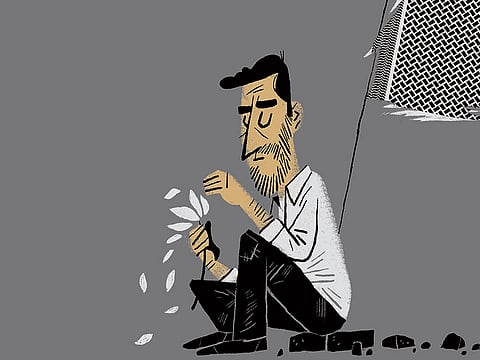A transforming Arab world
A hundred million Arabs have reform on their minds and are happy about their open-ended, not a preconceived, notion of societal change

Arabs who today live in countries in the Middle East and North Africa (Mena) brush up daily against dramatic change in their societies. Most are unaware of it. That’s because social, political and cultural change — change in our view of the world, as it were — as opposed to change in our individual lives, comes glacially, passing largely unnoticed.
The struggle of my generation in the late 1950s and early 1960s, as had been that of its parents’ generation, was anchored in the effort to undo the toxic effects of the Sykes-Picot agreement, signed in secret behind the Arab people’s back in May 1916, whose aim was to carve up the Levant between Britain and France after the defeat of the Ottoman Empire. Mark Sykes, the British Conservative Party politician, and Francois Georges-Picot, the hyperactive French diplomat, could scarcely have imagined the grief they would cause to future generations of Arabs that followed.
The military coups, demographic displacements, political upheavals, foreign interventions, Zionist encroachments and sectarian strife that have rocked our region over the greater part of the 20th century and into the new millennium bear these two men’s stamp. Directly or indirectly, the machinations embedded in the document they signed continued to have
a mastering grip on the sensibility of the generation of Arabs that I grew up with.
We called it “Arab nationalism” in those days, a struggle to achieve one united Arab nation that stretched from the maghreb (the land where the sun sets) to the mashreq (the land where the sun rises). Our rallying cry was: Unite all Arabic-speaking people in our part of the world within a single territorial homeland that includes a Palestine liberated from Zionism.
You ought to have lived in that era in order to touch base with the fact that how could that generation call for the unity of the Arab states and the emergence of the new Eden of Arabism. Had we looked closer, we would have discovered that the concept of Arabism was akin to mysticism, a discipline that begins in mist and ends in schism.
And here we are, six decades later, with our vision exposed as having been mockingly remote from reality. And the struggle for Palestine, since that time, has taken on a surreal dimension: As Arabs downsize their demands, Israelis escalate theirs.
Look at our domain today. With the exception of the countries in the Arabian Peninsula, countries elsewhere in Mena have failed to meet the challenges of modernity. In Iraq, an oil-rich nation, the official poverty rate last year was reported to be 30 per cent, up from 19 per cent in 2015. In sad, sad Syria, a crushed wasteland whose destroyed cities evoke the apocalyptic images of Dresden, the regime continues to portray itself as the only one that can keep order, when it is the regime’s excesses that are the primary cause behind the country’s misery.
Then take Egypt, the most populous nation in the Arab world and once a dominant regional power. In November last year, companies there put their expansion plans on hold owing to rising inflation.
And Lebanon? Libya? Palestine? Yemen? Well, we need to move on.
Yet, I’m a child of the 1960s, an eternal optimist, forever window-shopping for a new vision, forever looking for that silver lining. I do not fear for the future of our region.
True, we’ve witnessed plenty of grotesqueries that have wracked our part of the world in recent years (Daesh, the self-proclaimed Islamic State of Iraq and the Levant, for example, may be out of sight, but is not out of mind). And true, we’ve witnessed an Arab Spring, that fizzled out. But let’s keep in mind that the European countries, before they became prosperous, modern nation states, had to go through even worse grotesqueries. Consider in this regard the Thirty Years’ War in the 17th century, fought between 1618 and 1648, the longest and the deadliest religious conflict in the continent’s history, resulting in eight million fatalities.
Then there was the Spring of Nations in 1848 that, like our own Arab Spring in 2011, brought with it the hopes of so many people, from so many countries, but in the end was co-opted and went to rest in the history books. But did it? I say when a movement declines or is defeated, its energies and instigations are never dispersed. Rather, in a teleological spirit of history, they end up in time animating new modes of expression, new ways of dealing with the objective world.
As we speak, one hundred million young Arabs are accessing Facebook. One hundred million young Arabs are making the transition to adulthood. One hundred million Arabs have reform on their minds. These one hundred million Arabs, I say, are imbued, happily, with an open-ended, not a preconceived, notion of societal transformation — unlike the hundred million Arabs from my generation.
I wish we had all that in my time back in the 1950s and 1960s. Instead, we had to endure six-hour speeches — speeches that countless Arabs listened to in crowded neighbourhood cafes, while they smoked their water-pipes, enjoying only the rhythmic cadence of the words, since the words were not expected to either mean or say anything — delivered, as they were, by leaders who were not prone to evincing “input legitimacy” from their citizens or to giving space to adversarial minds.
Fawaz Turki is a journalist, lecturer and author based in Washington. He is the author of The Disinherited: Journal of a Palestinian Exile.



